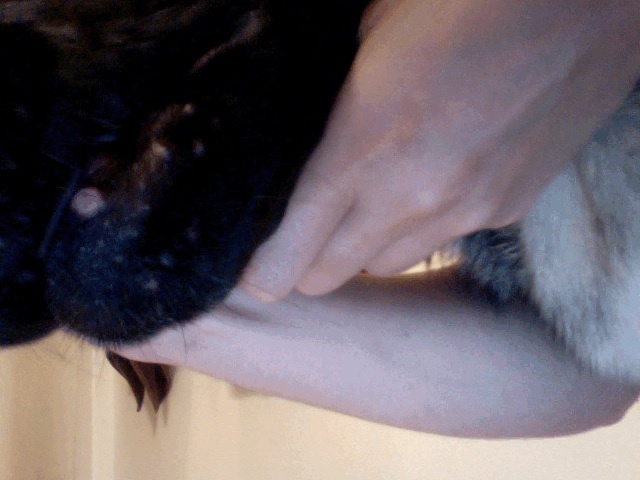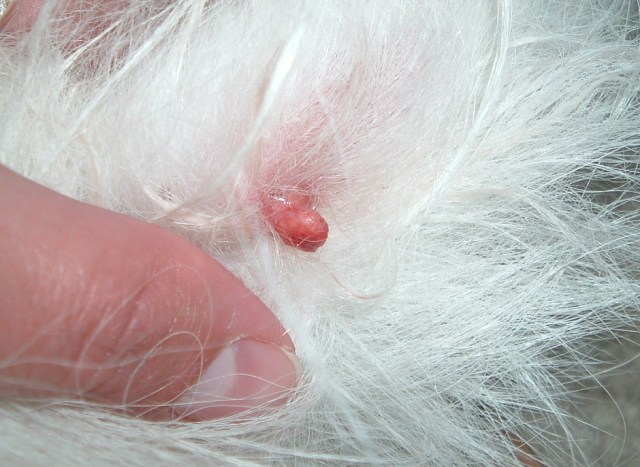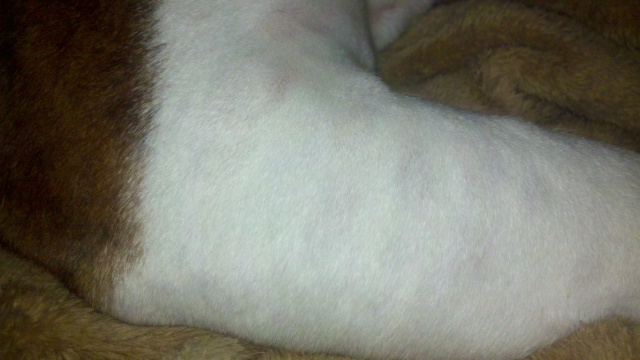Question
 ChupaLips1
ChupaLips1
Hi,
Thank you for your time in responding! We have 2 NSW registered female Australian terriers, both reds, littermates, age 4 years, show quality, from NSW Australia, house dogs, receive regular veterinary visits (I am a Medical Technologist) and both are on Sentinel and fed dry Hills Science Diet. They are healthy, however recently the normal black pigmentation of the lips of one of our dogs, Chupa, appears to have gradually been being displaced by what appears to be the underlying natural light pink color of the oral cavity/mouth tissue...? She also seems to lick her lips more than before this change occurred (though not constantly). About a year ago, due to excessive ear scratching, she was examined by the vet and diagnosed with a yeast infection of the ears for which she was prescribed an ear wash (Epi-Otic), Malacetic Otic (which appears to be acetic acid), and Mometamax (which appears to be an antifungal/antibiotic/anti-inflammatory combo ear drop), and was treated successfully with the above regimen and has had no recurrence of excessive ear scratching. An image is attached of Chupa's mouth in case this is helpful in answering the question. The questions are: 1) What could be causing the black pigmentation of the lips to be disappearing and/or being displaced by the pink color? 2) From the picture, does this appear to be a natural phenomenon or does it appear that a specific Dx of the cause of this change would more likely require a veterinary exam to R/O any pathological condition? Her sister Desi's lips (also a red) remain black. Thank you for your time in answering! Elizabeth J Burling
AnswerPigmentation can change naturally or from disease. Unfortunately, the only real way to know is to do a biopsy to see if there is an autoimmune disease causing this, like pemphigus or discoid lupus. It is very common for these 2 diseases to cause depigmentation on mucus membranes.


 Heartworm treatment side effects
Question
Charlie
My dog, Charlie, is a 30lb. mut
Heartworm treatment side effects
Question
Charlie
My dog, Charlie, is a 30lb. mut
 lactating dog
QuestionQUESTION: I am concerned with our 2 year old la
lactating dog
QuestionQUESTION: I am concerned with our 2 year old la
 German Shepard has red sore on lip
Question
sore on charlies lip
The other day I no
German Shepard has red sore on lip
Question
sore on charlies lip
The other day I no
 American Eskimo skin growth
Question
Buddy
We have a 9-11 Year old American Eskimo.
American Eskimo skin growth
Question
Buddy
We have a 9-11 Year old American Eskimo.
 Lumps on Dogs Legs and sides
Question
Front leg
This morning when I went to work my
Lumps on Dogs Legs and sides
Question
Front leg
This morning when I went to work my